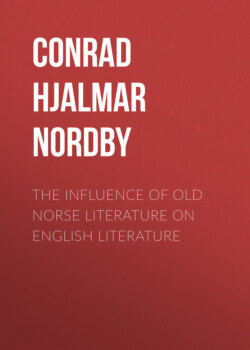Читать книгу The Influence of Old Norse Literature on English Literature - Conrad Hjalmar Nordby - Страница 10
На сайте Литреса книга снята с продажи.
SIR WILLIAM TEMPLE (1628–1699).
ОглавлениеTable of Contents
From the above list it appears that the earliest mention in the English language of Icelandic literature was Sir William Temple's. The two essays noted above have many references to Northern customs and songs. Macaulay's praise of Temple's style is well deserved, and the slighting remarks about the matter do not apply to the passages in evidence here. Temple's acknowledgments to Wormius indicate the source of his information, and it is a commentary upon the exactness of the antiquarian's knowledge that so many of the statements in Temple's essays are perfectly good to-day. Of course the terms "Runic" and "Gothic" were misused, but so were they a century later. Odin is "the first and great hero of the western Scythians; he led a mighty swarm of the Getes, under the name of Goths, from the Asiatic Scythia into the farthest northwest parts of Europe; he seated and spread his kingdom round the whole Baltic sea, and over all the islands in it, and extended it westward to the ocean and southward to the Elve." [6] Temple places Odin's expedition at two thousand years before his own time, but he gets many other facts right. Take this summing up of the old Norse belief as an example:
"An opinion was fixed and general among them, that death was but the entrance into another life; that all men who lived lazy and inactive lives, and died natural deaths, by sickness, or by age, went into vast caves under ground, all dark and miry, full of noisom creatures, usual in such places, and there forever grovelled in endless stench and misery. On the contrary, all who gave themselves to warlike actions and enterprises, to the conquests of their neighbors, and slaughters of enemies, and died in battle, or of violent deaths upon bold adventures or resolutions, they went immediately to the vast hall or palace of Odin, their god of war, who eternally kept open house for all such guests, where they were entertained at infinite tables, in perpetual feasts and mirth, carousing every man in bowls made of the skulls of their enemies they had slain, according to which numbers, every one in these mansions of pleasure was the most honoured and the best entertained." [7]
Thus before Gray was born, Temple had written intelligently in English of the salient features of the Old Norse mythology. Later in the same essay, he recognized that some of the civil and political procedures of his country were traceable to the Northmen, and, what is more to our immediate purpose, he recognized the poetic value of Old Norse song. On p. 358 occurs this paragraph:
"I am deceived, if in this sonnet (two stanzas of 'Regner Lodbrog'), and a following ode of Scallogrim there be not a vein truly poetical, and in its kind Pindaric, taking it with the allowance of the different climates, fashions, opinions, and languages of such distant countries."
Temple certainly had no knowledge of Old Norse, and yet, in 1679, he could write so of a poem which he had to read through the Latin. Sir William had a wide knowledge and a fine appreciation of literature, and an enthusiasm for its dissemination. He takes evident delight in telling the fact that princes and kings of the olden time did high honor to bards. He regrets that classic culture was snuffed out by a barbarous people, but he rejoices that a new kind came to take its place. "Some of it wanted not the true spirit of poetry in some degree, or that natural inspiration which has been said to arise from some spark of poetical fire wherewith particular men are born; and such as it was, it served the turn, not only to please, but even to charm, the ignorant and barbarous vulgar, where it was in use." [8]
It is proverbial that music hath charms to soothe the savage breast. That savage music charms cultivated minds is not proverbial, but it is nevertheless true. Here is Sir William Temple, scion of a cultured race, bearing witness to the fact, and here is Gray, a life-long dweller in a staid English university, endorsing it a half century later. As has been intimated, this was unusual in the time in which they lived, when, in Lowell's phrase, the "blight of propriety" was on all poetry. But it was only the rude and savage in an unfamiliar literature that could give pause in the age of Pope. The milder aspects of Old Norse song and saga must await the stronger century to give them favor. "Behold, there was a swarm of bees and honey in the carcass of the lion."
